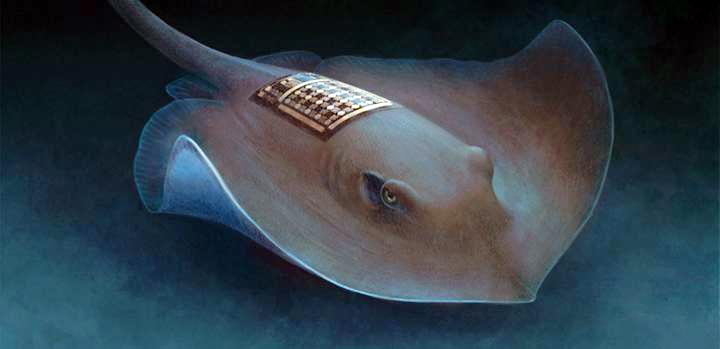Marine Skin dives deeper for better monitoring

The new version of Marine Skin showed improved performance, flexibility and durability when attached to different fish, including stingrays. Credit: © 2019 KAUST; Xavier Pita
Marine Skin is a thin, flexible, lightweight polymer-based material with integrated electronics which can track an animal's movement and diving behavior and the health of the surrounding marine environment. Early versions of the sensors, reported previously, proved their worth when glued onto the swimming crab, Portunus pelagicus.
The latest and much more robust version can operate at unprecedented depths and can also be attached to an animal using a noninvasive bracelet or jacket. This can, when necessary, avoid the need for any glues that might harm an animal's sensitive skin.
“The system can now operate down to a depth of 2 kilometers, which has never been achieved before by anyone,” says Ph.D. student Sohail Shaikh of the KAUST team.
The sensitivity of the monitoring electronics has also been enhanced by up to 15 times. The data collected reveals a tagged animal's depth and the temperature and salinity of the surrounding water. Further development is planned to incorporate additional environmental sensing capabilities, such as measuring oxygen and carbon dioxide levels and precise geolocation tracking.
Shaikh reports that a major challenge in developing the enhancements was to make the system sufficiently robust to tolerate operating at much greater depths. The researchers also managed to reduce the size down to half that of the previous version.
Tests also showed improved performance, flexibility and durability when the skin was attached to different fish, including sea bass, sea bream and small goldfish. Lab tests in highly saline Red Sea water also demonstrated integrity through a full month's immersion and 10,000 extreme bending cycles.
“Marine skin is a unique and groundbreaking innovation in wearable technology for marine animals,” says Muhammad Mustafa Hussain, whose research group has developed the system in collaboration with Carlos Duarte's group, also at KAUST.
Professor Hussain adds that Marine Skin outperforms all existing alternatives while emphasizing that ongoing development work will continue to enhance the sensing capacities, overall performance, reliability and affordability.
Media Contact
All latest news from the category: Information Technology
Here you can find a summary of innovations in the fields of information and data processing and up-to-date developments on IT equipment and hardware.
This area covers topics such as IT services, IT architectures, IT management and telecommunications.
Newest articles

High-energy-density aqueous battery based on halogen multi-electron transfer
Traditional non-aqueous lithium-ion batteries have a high energy density, but their safety is compromised due to the flammable organic electrolytes they utilize. Aqueous batteries use water as the solvent for…

First-ever combined heart pump and pig kidney transplant
…gives new hope to patient with terminal illness. Surgeons at NYU Langone Health performed the first-ever combined mechanical heart pump and gene-edited pig kidney transplant surgery in a 54-year-old woman…

Biophysics: Testing how well biomarkers work
LMU researchers have developed a method to determine how reliably target proteins can be labeled using super-resolution fluorescence microscopy. Modern microscopy techniques make it possible to examine the inner workings…





















